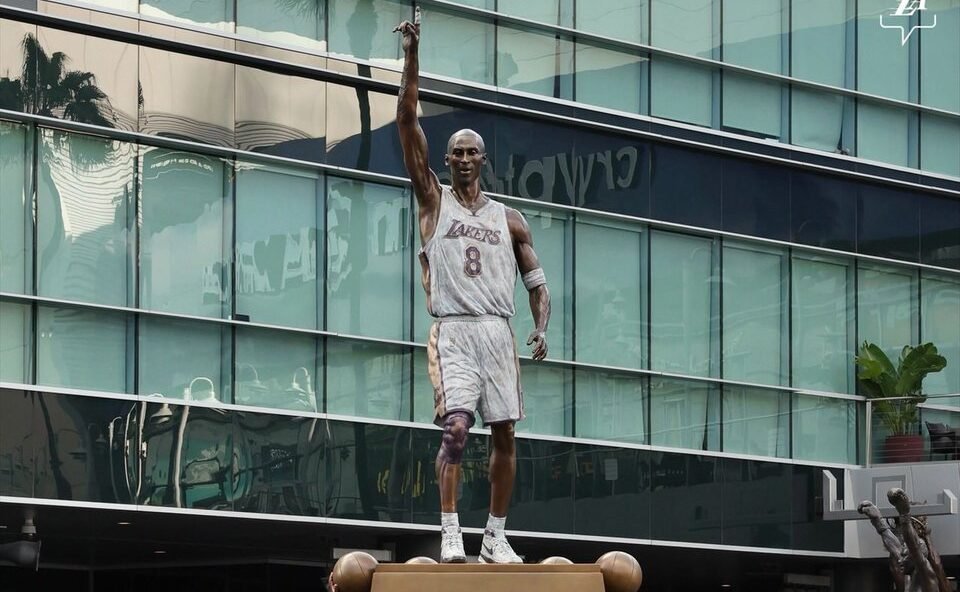Early Years (1947-1960):
- Founded in 1947 as the Minneapolis Lakers in the National Basketball League (NBL).
- Led by George Mikan, the “first superstar” of the league, they won five NBA championships in their first six seasons.
- Established themselves as a powerhouse team, drawing large crowds and helping popularize basketball across the country.
Hollywood Dynasty (1960-present):
- Relocated to Los Angeles in 1960, becoming the “Showtime Lakers” with their fast-paced, exciting style of play.
- Won seven championships in the following decades, featuring iconic players like Wilt Chamberlain, Jerry West, Kareem Abdul-Jabbar, Magic Johnson, and Shaquille O’Neal.
- Developed intense rivalries with teams like the Boston Celtics and Philadelphia 76ers, further fueling their popularity.
- Continued success in the 21st century with Kobe Bryant and LeBron James, adding several more championships to their legacy.
Present Day:
- The Lakers remain one of the most popular and valuable franchises in sports, despite recent struggles.
- Their rich history, iconic players, and passionate fanbase ensure their continued relevance in the NBA.
Importance of the Lakers in NBA History:
- Winningest Franchise: Tied with the Boston Celtics for most NBA championships (17).
- Dynasty Builders: Established two distinct dynasties, one in Minneapolis and one in Los Angeles, showcasing sustained excellence.
- Star Power: Boasted some of the league’s greatest players, from George Mikan to LeBron James, influencing the game and attracting fans worldwide.
- Cultural Impact: Popularized basketball through exciting play and Hollywood connection, contributing to the league’s growth and global reach.
- Rivalry Fuel: Sparked iconic rivalries that added drama and excitement to the game, enhancing its entertainment value.
-
Early Years: Foundation of Greatness
A. Origins of the Lakers franchise:
- Detroit Gems (1946): The story begins in 1946 with the Detroit Gems, a struggling team in the National Basketball League (NBL). Facing financial difficulties, the team was purchased by a group led by Ben Berger and Irwin Levin.
- Minneapolis Lakers (1947): With an eye on relocation, the new owners moved the team to Minneapolis, Minnesota, and renamed them the “Lakers” after the state’s nickname, “Land of 10,000 Lakes.”
- Early struggles and turnaround (1947-1948): Initially, the Lakers were mediocre, but a key decision changed their fortunes. They drafted a 6’10” center named George Mikan, who would become one of the first superstars of basketball.
B. George Mikan era: Laying the groundwork for success (1948-1954):
- Dominant force: Mikan, with his size, scoring prowess, and free throw dominance (due to an underhand shooting style), revolutionized the game and led the Lakers to immediate success.
- Championship reign (1949-1954): In their first six seasons as the Lakers, they reached the NBA Finals all six times, winning five championships (1949, 1950, 1952, 1953, and 1954). This established the Lakers as a powerhouse and laid the foundation for future success.
- Impact of Mikan: Mikan’s popularity drew large crowds and helped popularize basketball nationwide. He paved the way for future big men and is considered one of the greatest and most impactful players in NBA history.
-
Showtime Era: Magic, Kareem, and Dynasty:
This era, spanning from 1979 to 1991, is synonymous with breathtaking, fast-paced basketball and unmatched success.
A. Magic Johnson: The Face of Showtime:
- Drafted in 1979, Magic’s infectious smile, charisma, and dazzling passing skills personified the “Showtime” style.
- His “no-look” passes, fast breaks, and improvisation captivated audiences, revolutionizing the point guard position.
- His rivalry with Larry Bird further fueled the era’s excitement, creating iconic matchups.
B. Kareem Abdul-Jabbar: Tower of Dominance:
- Joined the Lakers in 1975, bringing his scoring prowess (still the NBA’s all-time leading scorer) and defensive presence.
- His iconic skyhook shot was unstoppable, providing a reliable foundation for Magic’s flashy passes.
- Abdul-Jabbar’s veteran leadership and focus balanced Magic’s youthful exuberance, creating a potent combination.
C. Championships and Rivalry with the Celtics:
- The Lakers reached the NBA Finals an astonishing nine times during this era, winning five championships (1980, 1982, 1985, 1987, and 1991).
- Their biggest rival was the Boston Celtics, led by Larry Bird. This rivalry, fueled by contrasting styles and personalities, became one of the most iconic in NBA history, drawing massive media attention and passionate fanbases.
Impact of the Showtime Era:
- Transformed basketball into a global phenomenon, attracting fans with its athleticism, creativity, and Hollywood glamour.
- Cemented the Lakers’ status as a basketball dynasty, influencing future generations of players and coaches.
- Showcased the importance of teamwork, as Magic and Kareem complemented each other perfectly, proving that different styles could coexist for success
-
Shaq and Kobe: The Dynamic Duo
The early 2000s witnessed an era fueled by two distinct forces, creating a partnership both dominant and turbulent: Shaquille O’Neal and Kobe Bryant.
A. Shaquille O’Neal: The Unstoppable Force:
- Arriving in 1996, Shaq brought raw power and an unstoppable presence to the paint. His size, strength, and dominance transformed the Lakers’ offense into a force to be reckoned with.
- He consistently averaged over 20 points and 10 rebounds, becoming a Finals MVP in 2000 and earning the nickname “Shaq Diesel” for his unstoppable motor.
- Shaq’s charisma and playful personality created a unique dynamic within the team, drawing fans and media attention.
B. Kobe Bryant: The Black Mamba’s Rise to Greatness:
- Drafted directly out of high school in 1996, Kobe’s dedication and work ethic quickly turned him into a scoring machine. He absorbed knowledge from veterans and honed his offensive skills, becoming a scoring threat from every area of the court.
- Bryant’s competitive spirit and “killer instinct” earned him the nickname “Black Mamba.” He pushed himself and his teammates, demanding excellence and striving for greatness.
- Kobe’s popularity grew alongside his scoring prowess, making him a global icon and a key marketing force for the Lakers.
C. Three-peat Championships and their Impact on the Franchise:
- The combination of Shaq’s brute force and Kobe’s offensive brilliance proved unstoppable. They led the Lakers to three consecutive NBA championships (2000, 2001, 2002), with Shaq earning all three Finals MVP awards.
- This era solidified the Lakers’ legacy, re-establishing them as a dominant force in the league. It generated enormous hype and cemented both players’ places as NBA legends.
- However, the partnership wasn’t without friction. Differences in personality, playing style, and media attention led to tension, ultimately contributing to Shaq’s trade in 2004.
Impact on the Franchise:
- This era not only brought championships but also ushered in a new generation of fans worldwide. Kobe and Shaq’s individual legacies were intertwined with the Lakers’ success, further solidifying the team’s global brand.
- Their impact transcended basketball, influencing fashion, music, and pop culture. They became cultural icons, forever linked to the Lakers’ storied history.
-
The Return to Prominence: Kobe’s Later Years
Following Shaq’s departure, Kobe embarked on a journey of self-improvement and leadership, eventually leading the Lakers back to glory.
A. Kobe’s Leadership and Perseverance:
- After Shaq’s exit, Kobe faced criticism and pressure. He responded by refining his leadership style, demanding more from himself and his teammates while fostering a sense of unity.
- His “Mamba Mentality” philosophy, emphasizing relentless work ethic, dedication, and a constant pursuit of perfection, became legendary.
- Kobe faced setbacks, including injuries and team struggles, but persevered, showcasing his mental toughness and unwavering commitment to winning.
B. 2008-2010: Back-to-back Championships:
- Kobe took center stage, carrying the offensive load and leading the team through challenging playoffs.
- He found key complementary players like Pau Gasol and formed a strong team identity.
- In 2008 and 2009, the Lakers defeated their long-time nemesis, the Boston Celtics, to win back-to-back championships, solidifying Kobe’s status as a champion both individually and as a leader.
C. Kobe’s Legacy and Impact on the Lakers Organization:
- Kobe’s leadership, work ethic, and winning mentality became ingrained in the Lakers’ culture, influencing future generations of players.
- His global popularity and marketing appeal boosted the team’s brand value and secured their position as a top franchise.
- He became a symbol of Los Angeles, inspiring millions with his dedication and drive. His tragic passing in 2020 left a lasting impact on the organization and the entire basketball world.
Beyond Championships:
While Kobe’s championships cemented his legacy, his impact goes beyond trophies. He:
- Embraced mentorship: He nurtured young players like Andrew Bynum and later mentored younger stars like Julius Randle, inspiring them with his work ethic and competitive spirit.
- Advanced the game: Kobe’s versatility and scoring prowess pushed offensive boundaries, influencing future generations of players.
- Transcended basketball: His dedication, sportsmanship, and philanthropy cemented his status as a global icon, earning him respect and admiration beyond basketball fans.
-
Conclusion: A Legacy Forged in Showtime and Grit
The Los Angeles Lakers’ journey is a testament to enduring greatness, showcasing evolution, adaptation, and unwavering pursuit of championships.
A. Reflection on the Lakers’ Enduring Legacy:
From George Mikan’s dominance to the Showtime era’s dazzling displays, from Shaq and Kobe’s power plays to Kobe’s later leadership, the Lakers have consistently captivated audiences and delivered iconic moments. They have:
- Won 17 NBA championships: Tied with the Celtics for the most in league history, solidifying their status as a powerhouse.
- Boasted legendary players: Mikan, Magic, Kareem, Shaq, Kobe, and countless others have donned the purple and gold, leaving their mark on the game.
- Pioneered exciting styles: From Showtime’s fast-paced brilliance to Shaq and Kobe’s dominance, they’ve continuously redefined basketball entertainment.
- Cultivated a passionate fanbase: With a global reach and dedicated supporters, the Lakers have transcended geographic boundaries.
The Lakers’ legacy isn’t just about trophies; it’s about captivating fans, influencing generations of players and coaches, and pushing the boundaries of the game.
B. Impact on the NBA and Basketball Culture:
The Lakers have undoubtedly left a significant mark on the NBA and basketball culture:
- Globalizing the game: Their Hollywood connection and exciting styles helped popularize basketball worldwide, attracting fans and inspiring future generations.
- Raising the bar for excellence: Their championship mentality and constant pursuit of greatness have set a standard for other teams to strive for.
- Shaping narratives and rivalries: From Magic vs. Bird to the Shaq and Kobe era, they’ve been at the forefront of some of the league’s most iconic rivalries, fueling interest and excitement.
- Inspiring future generations: From Kobe’s “Mamba Mentality” to Kareem’s skyhook, their iconic moments and legacies continue to inspire young players around the world.
The Lakers are more than just a team; they’re a cultural force that has shaped the NBA and influenced basketball’s global landscape.
C. Looking Ahead: The Lakers’ Ongoing Pursuit of Greatness:
Despite recent challenges, the Lakers remain committed to their legacy. With a rich history, passionate fanbase, and dedication to excellence, they continue to:
- Attract top talent: LeBron James’ arrival signifies their commitment to competing at the highest level.
- Honor their past: They maintain their iconic identity while adapting to the evolving game.
- Strive for championships: The pursuit of greatness remains embedded in their DNA, aiming to add more chapters to their storied history.






Can you be more specific about the content of your article? After reading it, I still have some doubts. Hope you can help me.